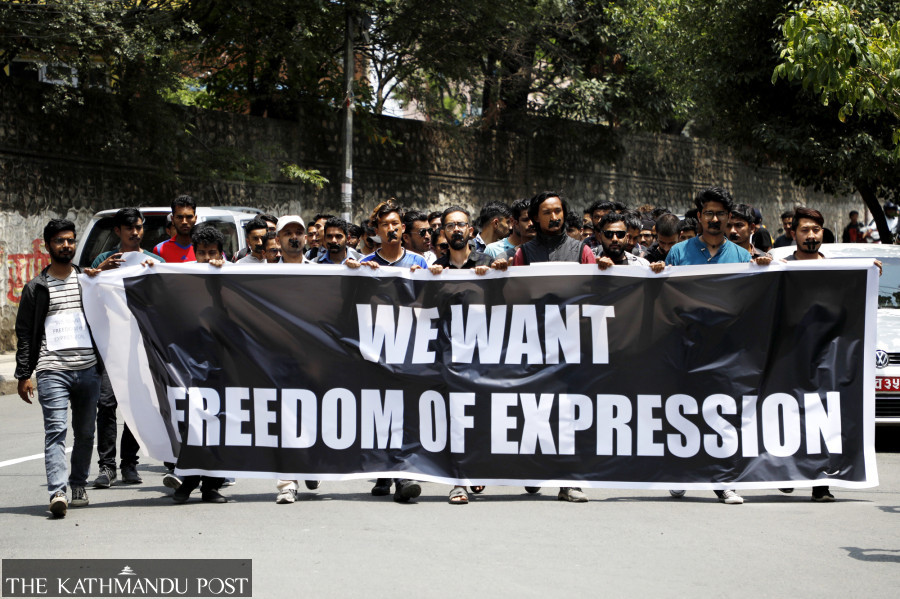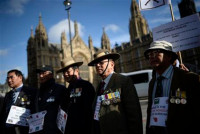National
Free speech advocates decry social media directive saying it oversteps Electronic Transactions Act
Government on Monday released the full text of the directive issued on November 10.
Post Report
The government on Monday released the full text of the 15-point directive on the Operation of Social Networking 2023. This comes in the wake of a ban on the popular social media platform TikTok announced earlier this month.
The government had released a part of the directive on November 10. The directive, among other things, makes it mandatory for social media sites such as Facebook, X (formerly Twitter), TikTok, YouTube and the like, to set up their liaison offices in Nepal.
Free speech advocates oppose the government’s attempts to regulate social media through administrative measures and assert that a new law or legal framework enacted by parliament is needed for doing so. Second, they said that the new directive contradicts the Electronic Transactions Act (ETA) on which it is said to be based.
Some social media companies have already opened their offices in Kathmandu, but others have yet to do so. The government said the measure was introduced in light of an increasing number of people complaining that the absence of the companies’ representatives in Nepal made it difficult for the authorities to address their users’ concerns and even to remove objectionable content from the platforms.
It was former Minister for Communication and Information Technology Gokul Baskota who first tried to introduce a similar kind of code and provision for social media regulation four years ago. His attempt faced serious criticism, but now he is happy that those who had opposed a similar provision are now happily welcoming it and defending it.
“My proposal was social media platforms like Facebook, X, TikTok and YouTube should register themselves in Nepal so that the government can collect the revenue,” said Baskota, adding, “but during my time, it was publicized that each and every social media user should register with the government which was not true.”
In the new directive, the government has asked social media companies to either set up an office in Nepal or appoint a focal person within three months of the enforcement of the directive. The directive also requires the social media companies to register themselves with the Ministry of Information and Communication Technology. The ministry can shut down the platforms that are not registered in Nepal.
“We also proposed that social media platforms should respect social norms and values of the country concerned. But this provision should not come through a directive, so it should be established within an act or provided with a legal framework. Directives like the recent one, only empower certain individuals. As we are witnessing increasing cases of social crimes due to the misuse of social media, the issue is no longer confined only under cybercrime,” said Baskota.
The directive includes a not-to-do list for social media users.
The directive says no one should create fake IDs on social media, share or make comments through such IDs. Likewise, people should not post any text, audio, video, or picture that spreads hatred against any gender, community, caste, religion, profession, or people from any particular group.
Taranath Dahal, chairman of the Freedom Forum that advocates for freedom of speech and expression, said that the overall content of the new directive is good, but basing it on the Electronic Transactions Act is wrong.
“We need a separate law because directive alone cannot regulate social media platforms. So the very basis of the directive is questionable. Parliament should enact a separate law. If we talk about the content of the directive, it is not that bad. Bringing social media platforms under the tax net and removing offensive content are good moves.”
He questioned some of the provisions of the directive as problematic. “Who holds the right to remove offensive content? Certainly, the government should employ a judicial approach while removing hateful, offensive content from social media sites,” said Dahal. Both Baskota and Dahal concur that social media should be regulated, but outright ban is wrong.
The new rule also bars any post promoting wrongful activities such as child labor, human trafficking, child marriage, and polygamy, among others.
The directive bans the use of words, audio, video, or images that spread hate speech and disrespect or defame others. Also banned are actions like distorting a picture, taking photos of private affairs, and publishing them without permission.
Similarly, posting vulgar words, pictures, videos, audio, animations, and content promoting paedophilia, sexual exploitation, prostitution, use and trade of narcotic substances, gambling, spreading fake news, distorted information, cyberbullying, and terrorism-related content are prohibited.
Santosh Sigdel, executive director of Digital Rights Nepal, opposes the new directive and says it goes beyond the scope of the Electronic Transactions Act.
“The government should bring a law for social media regulations after proper debate in parliament. Attempts to regulate social media through administrative measures will create problems. The new directive is apparently based on Section 79 of the Electronic Transactions Act, but it goes beyond the ambit of the Act. How do you define fake identity on social media?” said Sigdel.
“The new directive also infringes upon people’s right to association on social media. It discourages the creation of social media pages where like-minded people can connect as it prevents people with fake identities from joining such groups or pages,” said Sigdel, adding, “And only parliament should define or determine what is hate speech, not a directive.”




 23.05°C Kathmandu
23.05°C Kathmandu














